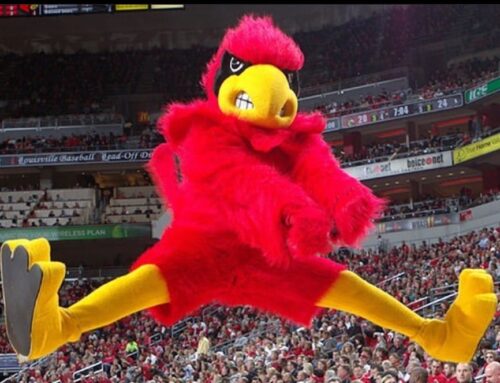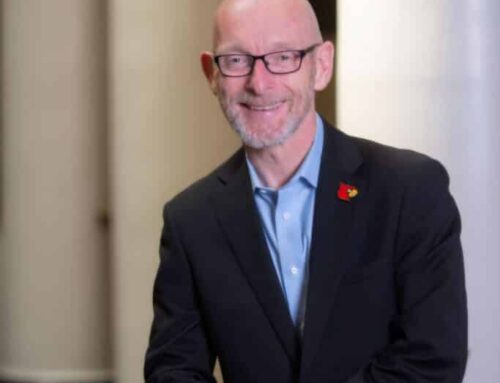
Anthony Bourdain rocketed to celebrity chefdom with the release of his book "Kitchen Confidential." He hosts "No Reservations" on the Travel Channel.
By Baylee Pulliam–
There’s an old tradition for properly raising, preparing and eating an ortolan, a small songbird native to France.
The bird is kept in a dark cage and forced to gorge itself until it’s round and fat, like a squishy, feathery Christmas tree bulb.
Then, when optimal plumpness has been achieved, the little guy is drowned with a lethal dose of high-proof brandy.
After the dead – or at least drunken – bird is cooked, the diner ritualistically dons a napkin-hood before devouring it wholesale – bones, innards and all. Gluttony is a sin, and you wouldn’t want your God – if you have one – to see, now, would you?
There are probably many worse ends than death-by-brandy. But one wonders if our little avian friend was ready to meet his maker. Or whether he wanted his tiny bones crunched and his insides slurped.
Then again, in the words of Anthony Bourdain, “that is one tasty f—ing bird.”
In their aptly titled “Good vs. Evil” show at the Kentucky Center for the Arts Saturday, chefs and TV personalities Bourdain and Eric Ripert tackled some of the more prominent ethical questions in food culture. Do ethics matter, when taste and tradition are involved?
Bourdain’s trademarked gaucho boots clunk against the stage floor as he circles Ripert. He interrogates the Frenchman on his immigration status, and eating endangered and threatened species, like the Bluefin Tuna, which Ripert refuses to serve in his restaurant – “on principle,” he says.
Ignoring the issue of rarity, Bourdain wonders if animal cruelty should be a factor. “Does it matter if it died screaming, if it’s provably delicious?” he asks.
Ripert and Bourdain agree it should. And that maybe, just maybe, “the Crocodile Hunter got what he had coming,” Bourdain said.
But maybe health is the bigger moral issue. And according to Bourdain, butter-addicted Food Network chef Paula Dean poses a big threat.
“Go through the cookbooks,” Bourdain said. “Which ones will kill you fastest? Of course, it’s Paula Dean.”
According to the Center for Disease Control, cardiovascular disease is the leading cause of death in America. And high-fat, high-salt diets, like those promoted by Paula Dean, aren’t helping.
They can also lead to obesity. In a 2011 study, The Lancet medical journal found nearly seven in ten Americans are either obese or overweight.
Ripert suggests banning things like trans fats and putting a tax on unhealthy foods.
“So a fat tax, then?” Bourdain asks. “Would you be okay with a $14 bag of Cheetos? A $24 can of Coke?”
“Absolutely,” Ripert said. He noted some companies, have set caloric limits on their food. Mars Inc. said last week their candy bars will soon be 250 calories or less.
Other companies, are phasing out the use of additives and lower quality ingredients. Earlier this year, McDonalds said they would not use ‘pink slime,’ the result of cleaning low-grade, and otherwise inedible meat with ammonium hydroxide so it can be served in their restaurants. The companies took these actions voluntarily, which leaves Bourdain wondering, “What is their market research telling them?”
“That people are waking up,” Ripert said. They’re becoming more aware of what goes into the food they eat.

Eric Ripert is the co-owner and chef of acclaimed New York City-based Le Bernardin. He hosts "Avec Eric" on PBS.
For example, he cites the growing trend of eating locally farmed food. “People are realizing when they eat food grown at local farms, they’re supporting those farms, and their own economy.”
And people are also more aware of world food culture, Bourdain said.
Ripert jokes about the global food experiences Bourdain has on his Travel Channel show, “Anthony Bourdain: No Reservations.”
In one episode, Namibian tribesmen fed their honored American guest the “best part” of a feral warthog – the rectum. “There was fur, and sand and crap in every bite,” Bourdain said. “But I’d eat it again.”
Travelers should keep an open mind about cultures and foods they’re unfamiliar with, he said. “I was a guest, and where I come from, when someone offers you something, you eat it.”
Bourdain said he follows the ‘grandma rule’ when he travels. You may not like it, but you clean your plate, he said. “It’s grandma’s f—ing house,” after all, and you should follow her rules, her traditions.
Which brings us back to the ortolan. Eating the rare bird has been outlawed in France for some time now, but its preparation speaks volumes about the food world’s moral gray area.
“It’s a very old tradition,” Ripert said.
“So is syphilis,” quipped Bourdain.
[email protected]
Photo courtesy KCConfidential.com




